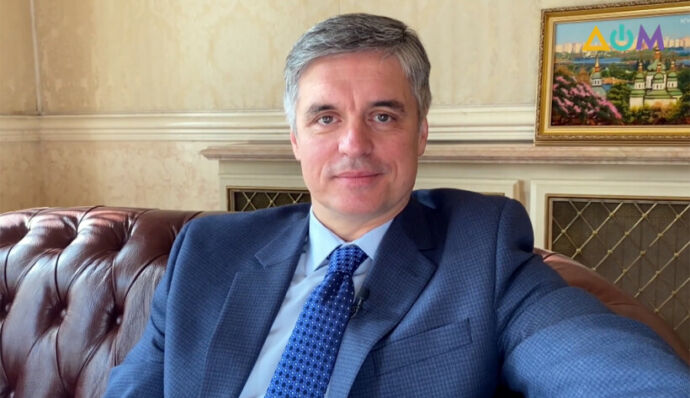A year ago, President of Ukraine Volodymyr Zelenskyy paid a visit to the UK. Then the governments of the countries signed a memorandum of understanding, according to which loan guarantees of up to GBP 2.5 billion (USD 2.7 billion) were provided for British-Ukrainian trade contracts.
What was realized in the year, when will be the next visit of Volodymyr Zelenskyy to London and what experience Ukraine can use to reintegrate the occupied territories – Ambassador Extraordinary and Plenipotentiary of Ukraine to Great Britain Vadym Prystaiko told in an interview to the Dom TV channel.
Vitaly Sizov hosts the interview.
– A year ago, a memorandum of credit guarantees was signed in the amount of up to GBP 2.5 billion. Are there any tangible results?
– This agreement, which was signed, is much broader than just the GBP 2.5 billion loan commitments. There are other issues, for example, trade. 98% of all our trading positions are now tax exempt and therefore we have significantly expanded our trading.
“Right now we see growth of about 60-70% in just one year”.
We have a strategic political relationship. Now there will be a meeting of a large group, the prime minister, deputy prime ministers, ministers and so on. That is, this dialogue is underway.
Indeed, one of the components of this agreement between Ukraine and Great Britain last year was a loan, half of which was to ensure the development of our fleet. We are literally a week before the completion of this complex process. I cannot reveal all the details, but the four directions being implemented will significantly strengthen our fleet. And this will be announced soon.
– Can you give a hint? Will we see some missile boats or maybe will some factories start working in Ukraine that involved in this process will?
– I am convinced that two operational ships will be purchased in the near future. That is, they do not need to be built. They will immediately become part of the Ukrainian Naval Forces.
Work on the construction of two naval ports will be started. These are absolutely new ports, which our Armed Forces and our fleet lack so much after Russia seized our infrastructure in Crimea.
Construction of smaller ships will begin in Ukraine and Britain. First, they will be built in Britain, then the technology will be transferred together with production to Ukrainian shipyards, which will allow us to attract our workers in the field, and will support local and general budgets. And the built ships will become part of our Naval Forces.
And finally, very important, we will receive missile weapons that will allow us to really enhance our capabilities at sea.
– Two ships are already constructed. What is the type of these ships? What kind of weapons?
– These will be two minesweepers. They will allow us to protect the coast from the mine threat. These are modern ships used by the British Navy. These two ships are equipped with the most modern weapons, state-of-the-art mine search and disposal capabilities. They meet all NATO standards. These are the ships that are in service with the British Navy.
– There are already some projects regarding the construction of military bases on the territory of Ukraine, at least a vision of where they will be located, how many of them?
– The first two bases will be constructed. One of them will be in the Black Sea, the second in the Azov.
“There is a British company that will integrate work on both bases and ships. In other words, this is one large project covered by that loan we talked about”.
There are projects. Work has already begun in the field – study, planning, georeferencing. All this will be done. These will be special naval protected bases where troops will be deployed, where personnel and their families will live. All that is need to ensure that these are modern NATO-standard naval bases.
– That is, Russia will no longer threaten to close the Black Sea as it is now?
– I believe that we need to do a lot in order to truly balance the opportunities of Ukraine and Russia in the Black Sea. We understand that we can count on the support of our partners in the Black Sea.
“We are not going to attack Russia, our task is to protect our own coast”.
– The head of the National Security and Defense Council of Ukraine said in an interview six months ago that our main partner is Great Britain, not the United States. Do you agree with this or is it still an exaggeration?
– Firstly, as an ambassador, I am proud that I work in a country that is, if not our most important strategic partner, then definitely one of two. Here I agree with Oleksiy Danilov that Britain is now the country that is open to us – open politically, militarily.
Now in the south of Ukraine a British naval mission is deployed, the construction of ships and bases will begin. This is in addition to what is being done in the political sphere: support, promotion to NATO and all the other steps that we need.
Therefore, I think, Danilov’s words are true. But I still would not forget that the bulk of the aid comes to us from the United States, as it is simply a much larger country with large capacities, primarily military and defense capabilities.
– In the context of a new defense alliance between Great Britain, the United States and Australia. This is the idea of North Atlantic integration. Perhaps the future belongs to such unions?
– I had the honor to serve on my first overseas assignment in Australia. I understand this country, I understand the region in which it is located, I understand the challenges facing Australia.
A military alliance called NATO is geographically limited by the North Atlantic. Therefore, the obvious step of the United States and Britain is to expand their presence in the region.
Let’s not forget that this alliance is based on the old ANZUS alliance (“Pacific Security Pact”, the military alliance of Australia, New Zealand and the United States – ed.), which ceased its active activities due to the positions of New Zealand. As you can see, New Zealand is no longer in the new union of the three countries.
Also at the heart of the new alliance and the intelligence alliance “Five Eyes” (includes Australia, Canada, New Zealand, Great Britain and the United States – ed.), that is a defensive development of an already existing union.
An idea is also being discussed in Ukraine: should Ukraine become a part of such a union? I think this is also the correct approach. While our main plan should be to advance into the North Atlantic Alliance, we must explore and try any opportunities that will increase our ability to defend ourselves.
– Recently, there has been a certain tension between Old Europe, Britain and the United States in the context of relations with France. Can Ukraine play on these contradictions and promote its interests in the defense sphere, get something more from those countries that Russian propaganda calls “British”, for example?
– I don’t think we can talk openly about our plans, how we are trying to play in this difficult game.
Rather, we can gain additional opportunities by being able to talk to everyone. We can speak to the UK separately, which is not a member of the European Union but remains an active NATO member. We can speak with overseas partners who were not members of the European Union.
At the same time, the role of the main engines of European unification, such as France and Germany, is growing. And therefore, we must cooperate with them more closely and, if possible, get the most out of this interaction.
I am quite skeptical now about the defense capabilities of the European Union without such a powerful partner as the United States, which is now obviously the largest military force in the world. It seems to me that all this effort is a bit like a double use of funds. Instead of investing in the development of the North Atlantic Alliance, certain movements are taking place that scatter the taxpayer money of all these European countries. It seems to me that it would be possible to keep more focused and have more strength to resist Russia. We see how aggression increases. I think now is not the time to look for alternatives.
– Are there any high visits planned, signing of documents? What are the main plans of the embassy in Britain now?
There are many plans and they are being implemented little by little. For example, there is already information about the completed project for the supply of test equipment to Ukraine to resist coronavirus. This was also acquired under the loan agreement that we started our conversation about. This is just the first step.
The rest of the projects – there are many of them, they are infrastructural, medical, and energy. They all move a little bit.
“At the end of this month, we are expecting a visit to the United Kingdom by a high delegation led by the President of Ukraine”.
Later we will have a strategic dialogue meeting as part of the implementation of the annual agreements. I hope that the Ministers of Foreign Affairs of Ukraine and Britain in a month will be able to review what has been done over the year and direct their efforts to the future.
These visits are ongoing. Recently there was Deputy Prime Minister for Reintegration [Oleksii Reznikov] who was interested in the UK’s experience of how to reintegrate territories. We are especially interested in what happened in Northern Ireland, how this hatred and terrorism grew into a political process and now everything is more or less settled.
– You remembered Northern Ireland. As far as I understand, you are not particularly keen on such options. Because you were very critical of the Minsk Agreements, which, given their ideal implementation – subject to the withdrawal of troops and the return of the border – still contain provisions similar to what happened there – a complete amnesty, some local rights, and so on. How appropriate is this Northern Ireland experience?
– We have just been living in the state of the Minsk agreements for seven years, which were planned for one year.
“The political situation has changed during this time. It seems to me that this is the reason for the lack of progress, evidence that the Minsk agreements have played their part”.
Yes, this was an important stage in stopping the aggression. But already it is necessary to move on to the next stage. And we should not remain a victim of political racketeering, when a solution is imposed on us, which obviously does not suit us, and with this decision we are blackmailed for years. Despite all the success of Northern Ireland’s reintegration, this process is not yet complete. And after Britain left the European Union, things got more complicated. This was precisely the subject of the dialogue during the visit here of Deputy Prime Minister Oleksii Reznikov. To understand what can be taken from this experience and what is obviously not. For example, you and I understand that there are no religious differences in Ukraine, as were in Northern Ireland. This is an interesting enough experience, but it should not be applied in Ukraine. However, there are some things that can be applied. Again, Great Britain is actually the federal United Kingdom. Ukraine is a unitary state. Some experience is interesting, but not all.










